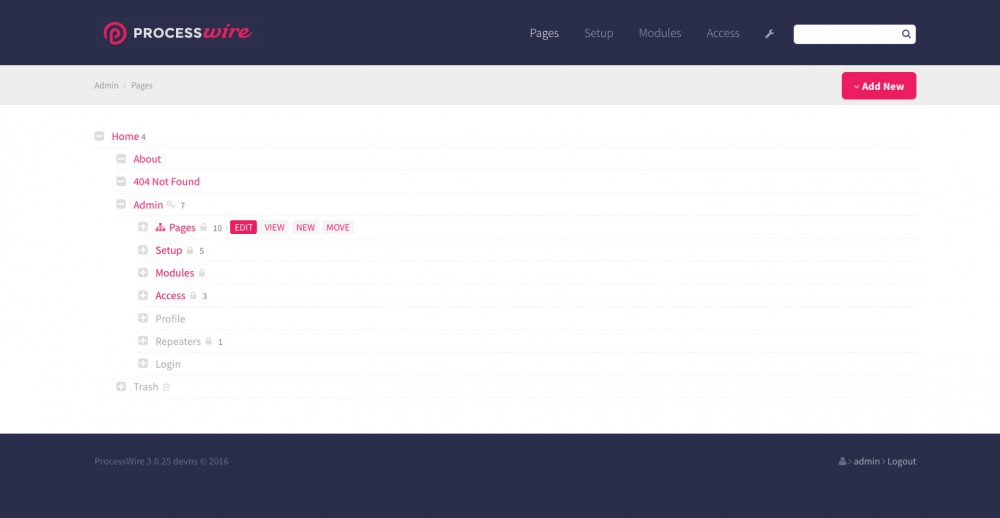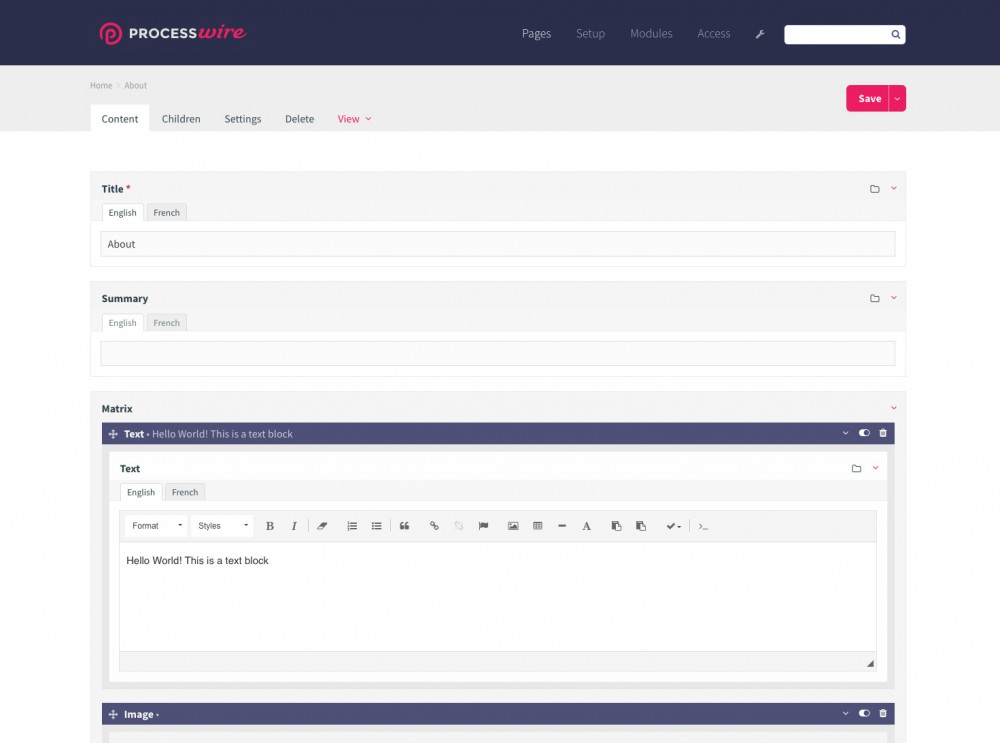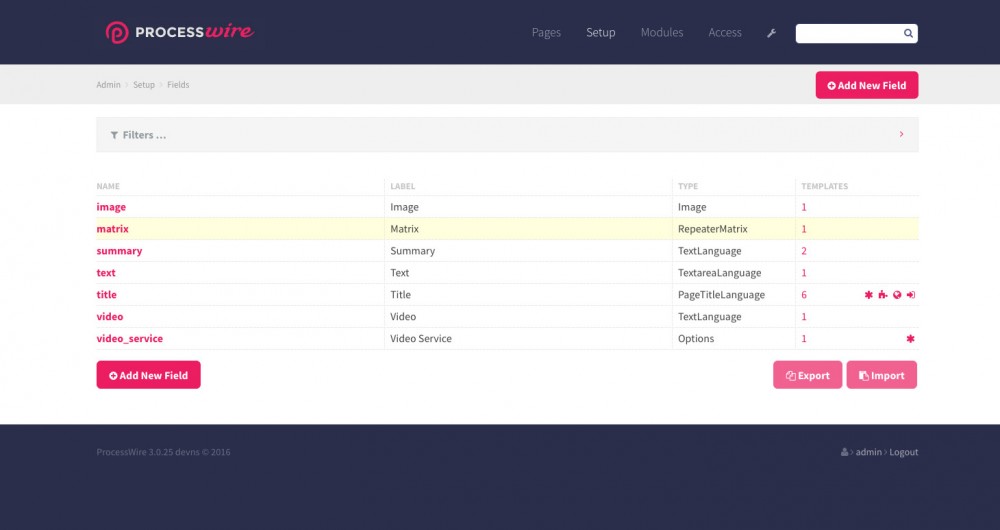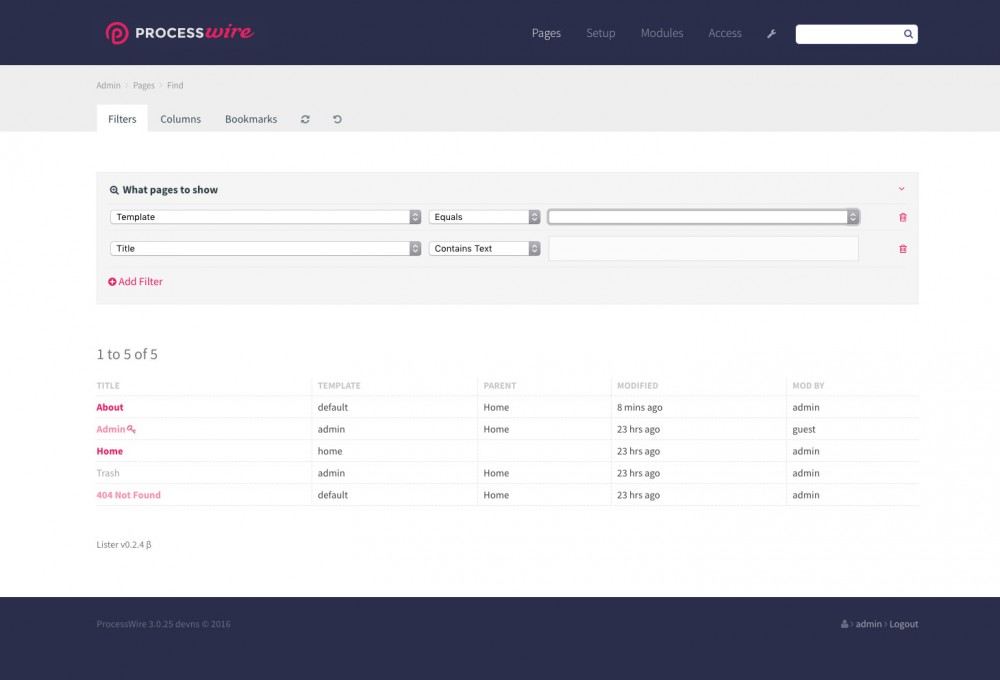Leaderboard
Popular Content
Showing content with the highest reputation on 08/08/2016 in all areas
-
I just added a new Metadata section to the Mail panel, as well as linking the attachments so you can easily check them. Note that the Metadata section has currently only been tested with @horst's WireMailSmtp module. Please let me know if you have any problems/requests for use with wireMail's default use of PHP's mail() function, or @teppo's SwiftMailer module.4 points
-
I just want to write how much I feel welcomed in this community. I came for the tech, but stay for the community. Just wanted to say how awesome are you guys and gals here at the PW community. long live PW and the jolly folks at its community4 points
-
Thanks! There were many z-index issues so far and one of the latest fix was more subtle, and there are some side effects that needs to be eliminated. Panels are already fixed in the latest version (unreleased yet). I'll check the flash menus too.3 points
-
Honestly it's probably not going to matter much here, so I'd say go with whatever is more readable to you. But since you asked: technically, if you can get something done with just one find/get operation rather than two, that's going to have an edge. Meaning, your single $pages->find("template=article,author=john"); is probably going to be the most efficient. But not likely in a way that's going to be measurable. Something to note is that both $pages->get() and $page->children() (and pretty much any method that returns pages from the DB) are simply front-end's to $pages->find() with certain assumptions placed on top of them. Not much of a performance hit, but you are right that it's not as efficient as just letting it load at the original URL. That's because behind-the-scenes your homepage is first being rendered (or at least its template is being called), and then another page is being rendered from it. If you don't want any compromises at all, even if small, then you could instead make your homepage template perform a $session->redirect($article->url); to the actual article page URL, and that way your homepage URL segment code would just be handling the requests that come in externally. Your local URLs would already be pointing to the /articles/article-url/. As for whether you are thinking too much, maybe. We're talking about micro optimization here. If you have a preference for using the /article-url/ URLs off the root, then that should carry more weight than the micro optimization. And if you are rendering pages off the root like that, make sure you are using <link rel='canonical'> tags in your document head so that the search engines don't think you've got duplicate content.2 points
-
BTW you probably saw but there was a fix pushed for this. Worked for me.2 points
-
Yeah, sorry about the frequency of updates But in all seriousness you might want to take a look at: https://github.com/adrianbj/ProcessModuleToolkit It's not officially released because there are some outstanding issues I haven't managed to get back to, but one thing it does (it has lots of features), is that it adds a "Batch Upgrade Modules" button to Ryan's Upgrades module. This makes upgrading multiple modules super quick with one click. It also makes installing modules with your preferred config settings really easy. Lots of great options. I guess I really need some more interest from you guys to get the motivation to finish it off.2 points
-
Forked here to add support for editing module files from /site/modules, plus on PW3 namespaced textarea inputs are also detected: https://github.com/rolandtoth/ProcessTemplateEditor2 points
-
For this proposal Ryan build a great module that works really good: https://processwire.com/api/modules/profields/autolinks/ From my point of view Ryan is right on his choice to let only admins set the terms if an automatic is running... The mixture of user defined terms and automatic replacement could be very dangerous. But you could simple fork and change the module and switch from the ||regex|| to a exact search for the terms and replace them automagical.....since i'm a "second hand" webdev + living on a farm in south germany = summertime is some harvest and less time for the desk best regards mr-fan2 points
-
I believe the lazy cron can be triggered on every pageload by every user, including guest, and you don't need to add the db-backup permission to guest for this to happen. I asked about this too and @kixe responded... Agreed. Also, the module description on GitHub and the modules directory seems to contradict the above so perhaps that needs to be corrected?2 points
-
You can do a $modules->isInstalled("ModuleClassName") check in the template file and do your own error / notification handling.2 points
-
I've been working on a version of the core theme based on some proposals in the forums on a new processwire.com design. It's entirely derived from the default theme and inspired by ideas around a new ProcessWire look and feel. I wanted something that I'd be proud to show clients, and something that could draw developers to ProcessWire who might have been turned off by the default admin UI. This was created by working from the default theme, and developed organically over time. It's not coded in the most efficient way, but I hope it's useful for some of you. I'd love to see a cleaner look in the default theme. Ryan, if you see anything you like, please steal it! Likewise if you see anything you think could be improved, I'm all ears. -Brent AdminThemeSubtle.zip1 point
-
1 point
-
if you are worried of the urls because you are migrating the site and want to avoid 404s from old links, you can also use this awesome module:1 point
-
Nope and nope, but caching URL Segments is supported by both ProCache and the (built-in) template cache. Any chance you could replace GET params with URL Segments for this use case? If that's not an option, I would suggest going with the answer you're not looking for – MarkupCache or WireCache1 point
-
I'm getting the following error after updating to 3.0.29 when trying to save a page Error: Call to a member function add() on a non-object (line 629 of /home/peterand/public_html/vpdd/wire/modules/Process/ProcessPageEdit/ProcessPageEdit.module) Anyone got any ideas? EDIT: Sorry, didn't check GitHub: https://github.com/ryancramerdesign/ProcessWire/issues/19651 point
-
Packt Publishing is also giving an ebook away each day. https://www.packtpub.com/packt/offers/free-learning1 point
-
Hi, I wrote a new module this evening: Template Editor This module adds the possibility to edit and rename template files directly from the backend. Requirement: It's important to have this module installed and PW 2.2 running. Download: http://modules.proce...emplate-editor/1 point
-
v038 is uploaded with fixes for perhaps all the issues reported above, thanks for all! This also contains the FieldEditLinks tweak and other fixes. PW compatibility was set to 2.8, though as I see the modules directory doesn't have this option.1 point
-
1 point
-
Yeah, I am getting the same error creating a new page. As above, creating the page with a title is no problem, but saving that page either as publish or keep unpublished throws the error Error: Call to a member function add() on a non-object (line 629 of /xxxx/wire/modules/Process/ProcessPageEdit/ProcessPageEdit.module) Happening on two sites on the same shared server. Error: Call to a member function add() on a non-object (line 629 of /home/dancingb/public_html/cchogan.com/wire/modules/Process/ProcessPageEdit/ProcessPageEdit.module)1 point
-
As for now I allowed clicking on the fieldname that slides in to edit the field. It opens by default in new tab (configurable to open in panel or modal). I'll keep the ctrl-click option too. (AOS's ctrl+s is addictive. I find myself more and more trying to save my comments here that way :))1 point
-
1 point
-
Just use the same hook and test (if it's a post request and) if your button was clicked – it's name is present in the post data. If so execute something. If not go one without it.1 point
-
1 point
-
You could try out my rest api helper https://github.com/NinjasCL/pw-rest Alamo Fire as AFNetworking its format agnostic, so it could easily adapt to your api design I recommend you to follow http://jsonapi.org principles. also reading this book https://leanpub.com/build-apis-you-wont-hate and this book https://leanpub.com/iosappswithrest could help you start out. If you need something done quick maybe using Parse Server SDK its more appropriate for a middleware (you can call PW later with that) https://parseplatform.github.io1 point
-
http://venturebeat.com/2016/08/03/microsoft-launches-excel-api-out-of-preview/1 point
-
I would say JSON is a good solution if Alamofire likes or requires it..."just" use the format most convenient for your app or the framework..pw doesn't care I don't know why you wouldn't get any output, just tested your code and I'm using something similar for sitemap.xml as suggested by Ryan Nowadays (don't remember which version introduced this feature) you don't need to set the header in your template yourself you could set the template in the backend to json what pw version are you running and how does your template setup look like? do you have a pre- and appended template file (think this is called delayed output)? But probably not if it's just you app backend and not a "normal" website.. And what do you get when you request this page from your browser?1 point
-
1 point
-
Some cross-linking and gratuitous self promotion I have just implemented highly configurable CSV exporting (admin and API) into Batch Child Editor: https://processwire.com/talk/topic/6102-batch-child-editor/page-2#entry95855 It does lots of work for you, including supporting ProFields Textareas and Multiplier, along with outputting Page field title/name, rather than ID. Export settings can be configured by the developer and/or the site editors. It might be useful for others searching for CSV export and finding this thread.1 point
-
Too simple to be a module, consider a script like this: $array = $pages->find("template=basic-page")->explode(function($item){ return array( 'id'=> $item->id, 'title' => $item->title ); }); $fp = fopen('file.csv', 'w'); foreach ($array as $fields) fputcsv($fp, $fields); fclose($fp); Note, $pagearray->explode() used here is only available in 2.4 (2.3 dev) http://cheatsheet.processwire.com/pagearray-wirearray/getting-items/a-explode/ And the anonymous functions requires php >= 5.3 http://php.net/manual/de/functions.anonymous.php1 point

















